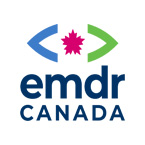
How to Become an EMDR Therapist in Canada
Want to practice EMDR in Canada? We are your source for up-to-date information on designations, training, and more so you can move forward with confidence. Explore our resources as you prepare for your training, then join us as a member for even more benefits and support!
Why Practice
EMDR >
Designations and Certifications >
Find Training >
Membership for New Therapists >
Why Practice EMDR?
Are you a mental health practitioner who works with those who have experienced trauma?
EMDR is one of the fastest-growing and widely researched modalities for the treatment of PTSD (along with a growing number of other presenting issues). Clinicians often attend EMDR training because they’ve heard from both other professionals as well as EMDR clients that “EMDR works like magic”.
EMDR is great for clinicians who…
- Work with a trauma-informed lens and with populations that have experienced a breadth of trauma (i.e., complex-trauma / complex-PTSD, dissociative disorders, etc.)
- Work in school settings, as EMDR can help children manage distressing events from home or at school, as well as support them in managing anxiety related to school.
- Work in hospital settings, as EMDR can assist clinicians in helping clients with the grief and trauma of medical procedures as well as helping their families to cope.
- Work with members of the military or others who are unable to share details of their trauma, as clients do not have to share their entire story when engaging in EMDR (though they can choose to do so).
- Work in private practice, as referrals to clinicians who have been trained specifically in EMDR continue to grow as more physicians and mental health professionals learn about the evidence behind this treatment. Many insurance companies (e.g., Workers’ Compensation Board Alberta) also recognize EMDR treatment as a valid traumatic treatment modality.
- …and beyond! New applications for EMDR are constantly being studied and uncovered. If you think EMDR could benefit your practice or clients, you are probably in the right place!
Join the rapidly growing number of clinicians who are getting trained in EMDR and help your clients reach their full healing potential with EMDR Canada.
EMDR Designations and Certifications in Canada
1. Basic EMDR Trained Therapist
A clinician who:
- is licensed in a mental health profession to practice independently and is member of a professional order
- has at least two years of experience in his field of license
- has completed an EMDRIA Approved Basic EMDR Training Program
- respects the EMDRIA Code of Conduct
According to the EMDRIA requirements, a Basic Training provides instruction in the current explanatory model, methodology, and underlying mechanisms of EMDR through lecture, practice, and integrated consultation. The minimum training requirements include:
- 20 hours of instructional material,
- 20 hours of supervised practicum, and
- 10 hours of consultation.
A Basic EMDR Trained Therapist has the knowledge and skills to utilize EMDR, an understanding of case conceptualization and treatment planning, and the ability to integrate EMDR into his or her clinical practice.
Requirements to Begin
You must be a: licensed Mental Health Professional or Pre-licensed Mental health professional (actively pursuing a license working under a licensed supervisor) or Graduate Students (First year graduate students are not eligible)
Requirements for Completion
Complete an EMDRIA Approved Basic EMDR Training Program. This can be done online or virtually and is typically offered in 2 formats:
In a 5-day intensive
Split into 2 parts, completed over several days at different times. (e.g., 3-5 days the first part, then taking a several week break to practice and then returning for part 2 of 3-5 more days of training).
Once complete, you can:
- Fully practice and integrate EMDR, one of the gold-standard treatments for PTSD, into your practice
- Call yourself an EMDR Trained Clinician
2. EMDRIA Certified Therapist
An «EMDRIA Certified Therapist» is a clinician who has completed an EMDRIA Approved Basic EMDR Training Program.
In addition the clinician:
- has conducted a minimum of 50 clinical sessions with at least 25 clients in which EMDR was utilized
- has received 20 hours of consultation by an Approved Consultant in EMDR
- has completed 12 hours of EMDRIA approved Continuing Education credits in EMDR
- has to obtain 12 hours of EMDRIA approved Continuing Education credits within each subsequent two year period in order to maintain the EMDRIA Certified Therapist status.
EMDRIA Certified Therapist (voluntary – not required to offer EMDR) >
Requirements:
Completion of a licensed Basic EMDR Training
Find an EMDRIA-Approved Consultant/s to provide you with individual and/or group consultation
Conducted a minimum of 50 clinical sessions with at least 25 clients in which EMDR was utilized
Received 20 hours of consultation by an Approved Consultant in EMDR
Completed 12 hours of EMDRIA-approved Continuing Education credits in EMDR
Continue to obtain 12 hours of EMDRIA approved Continuing Education credits within each subsequent two year period in order to maintain the EMDRIA Certified Therapist status.
Once complete, you can:
Pursue further training and excellence in the delivery of the 8-phase standard protocol of EMDR
Pursue the Consultant-in-training path
Call yourself an EMDR Certified Therapist
3. Consultant in Training
A «Consultant in Training» is a clinician who obtained the status of «EMDR Certified Therapist».
In addition, the clinician
- is in the process of completing the criteria to become an Approved Consultant in EMDR
- is receiving consultation-of-consultation from an EMDRIA Approved Consultant
Requirements:
Completion of the EMDRA Certified Therapist process
Worked closely with an EMDRIA Approved Consultant, receiving training on providing EMDR-specific consultation, further enhancing your expertise in the delivery and utilization of EMDR.
Once complete, you can…
Provide consultation to EMDR Trained Clinicians who have completed the Basic EMDR Training.
4. EMDRIA Approved Consultant in EMDR
An «EMDRIA Approved Consultant» is a clinician who has obtained the status of «Certified Therapist in EMDR».
In addition, the clinician:
- has three years of experience with EMDR after completing an EMDRIA Approved Basic Training Program
- has conducted at least 300 clinical sessions in which EMDR was utilized
- has received 20 hours of consultation-of-consultation from an EMDRIA Approved Consultant
- has to complete 12 hours of Continuing Education credits in EMDR every two years in order to maintain the EMDRIA Approved Consultant status.
Requirements:
Completion of EMDRA Certified Therapist process
3 years of EMDR experience since competing an EMDRIA approved EMDR Training program
Conducted at least 300 EMDR sessions with at least 75 clients
20 hours of Consultation-of-Consultation by an EMDR Consultant in EMDR
EMDR Consultant Letter(s) of recommendation
Letters of recommendation regarding professional Practice
12 Hours of EMDRIA Credits
EMDR International Association Policies Agreement
Once complete, you can…
Provide consultation to EMDR Trained clinicians and EMDR Certified Therapists
Provide consultation for consultees pursuing EMDRIA Approved Consultant Status
Refer to yourself as an EMDRIA Approved Consultant, demonstrating your expertise in deliverance in EMDR
5. EMDRIA Approved Trainer
An EMDRIA Approved Trainer is an Approved Consultant in EMDR who meets all criteria to offer EMDRIA Approved Basic EMDR Trainings. A list of all Canadian Basic Training Providers is in the training section of this site.
Requirements:
Completion of EMDRA Approved Consultant process
Follow the EMDRIA process for becoming a trainer (contact them directly for details)
Once complete, you can…
Provide EMDR training
Refer to yourself as an EMDR trainer
Find EMDR Training
EMDR Canada does not offer training directly, but we are here to help you find the resources you need! Use our calendar below to find an upcoming training session, or find consultants and trainers near you in our database.
Become an EMDR Canada Member
A supportive, community of like-minded professionals
Once you complete your training, designation, be sure to join EMDR Canada as a member. EMDR Canada members also get a complementary EMDRIA membership, so you can get connected with other therapists near you while enjoying two professional memberships in one.
Get started as an EMDR therapist
Frequently Asked Questions
How long does it take to become an EMDR therapist?
Attending an EMDR International Association approved Basic Training which can be completed either in a 5-day intensive course or over 2-parts typically spread several months apart. Then, the Basic training requires you to complete 10-hours of group consultation over the period of 1 year after your basic training; this is often offered with the training.
Can I train to earn an EMDR designation virtually?
Yes. Many organizations offer virtual EMDR Trainings. Please view EMDR Trainer details here
Is there a test involved to become an EMDR Therapy provider?
No. During your Basic Training, close to 50% of the training is a practicum portion to which you will practice the delivery of EMDR. During this practicum, you will be supported by your training team to ensure that you are delivering the 8-phase protocol with fidelity.
What is the difference between an EMDR Therapist and an EMDRIA Certified Therapist?
An EMDR Therapist is a clinician who has completed the Basic training requirements and is allowed to deliver EMDR therapy in their practice. An EMDR Certified Therapist is the next step up, where the clinicians seeks out further individual and group consultation in order to improve and gain further in-depth knowledge of being able to deliver the EMDR 8-phase protocol.
What is the difference between an EMDR therapist and consultant?
An EMDR Therapist is a clinician who can provide EMDR therapy to their clients. A Consultant is a clinician with further extensive training and consultation in the excellence of the delivery of EMDR therapy and can also provide consultation to newly training EMDR clinicians, EMDR Clinicians seeking certification, or EMDR Consultants-in-training.
How do I find a consultant to work with?
You can search for EMDRIA Approved Consultants, filtering by location and expertise on our directory here.
How much should I charge?
This will be up to each and every individual as per their own practice. EMDR Canada does not have a recommended fee schedule for EMDR Consultation.
Who can I contact with questions?
For more information, please use our contact form to get in touch with our team.
